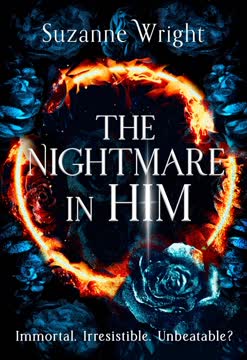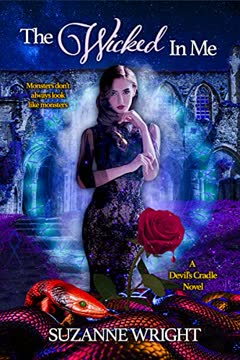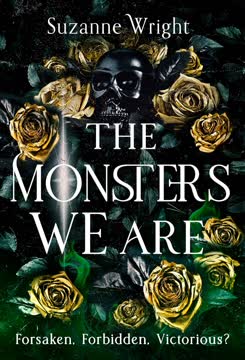Plot Summary
Fugitives in Devil's Cradle
Wynter Dellavale, a revenant witch, leads her coven of outcasts in Devil's Cradle, a town that shelters the supernatural, the criminal, and the desperate. Hunted by the powerful Aeons and with bounties on their heads, Wynter and her friends—each with their own traumas and quirks—try to build a life in a place where safety is bought with a piece of one's soul. The town, ruled by the enigmatic Ancients, is both haven and prison, its protection coming at a steep metaphysical cost. Wynter, marked by the deity Kali, is both feared and misunderstood, her true nature hidden until violence and fate force her secrets into the open.
Revenant Priestess, Cursed Land
Wynter's past is marked by betrayal: exiled from Aeon after cursing its land in vengeance for her mother's murder, she becomes a revenant—undead, unkillable, and bound to Kali's will. Her curse rots Aeon, sparking a war between the immortal Aeons and the Ancients, the latter being the only force the Aeons truly fear. Wynter's coven, the Bloodrose, is a found family of witches and misfits, each haunted by their own pasts. Together, they navigate the dangers of Devil's Cradle, where every alliance is transactional and every day is a fight for survival.
The Monster Within
Wynter's resurrection by Kali comes with a monstrous price: she harbors a vengeful entity within, a force of destruction that emerges in moments of mortal peril. This monster, neither loyal nor controllable, is both her greatest weapon and her deepest fear. Her relationship with Cain, the most powerful of the Ancients, is complicated by secrets—both harbor monsters, both are marked by darkness, and both are wary of revealing too much. Their connection is primal, built on mutual respect, desire, and the unspoken understanding of what it means to be truly other.
Saul's Vengeance Unleashed
Saul, a powerful Aeon and brother to Wynter's nemesis Lailah, seeks vengeance for his sister's death and the blight on Aeon. His obsession with Wynter drives him to desperate measures: stalking her through reflections, attacking her in the woods, and later, manipulating dreams and minds to try to end her. Saul's vendetta is personal, fueled by grief, guilt, and a need to prove his own power. His repeated failures only deepen his madness, making him a relentless, unpredictable threat to Wynter and all of Devil's Cradle.
Blood, Betrayal, and Bargains
The politics of Devil's Cradle are treacherous: protection is bought with pieces of the soul, and every resident is both a potential ally and a potential betrayer. Wynter's relationship with Cain deepens, culminating in his claim of her as consort—a rare, binding partnership among the Ancients. Yet, secrets fester: the true nature of Cain's monster, the history of the Ancients' imprisonment, and the shifting loyalties of those around them. Betrayals come from unexpected quarters, as old enemies and supposed friends alike are revealed to have their own agendas.
The Ancients' Prison
The Ancients, once powerful beings, are trapped in Devil's Cradle by an unbreakable cage created by the Aeons. Their only hope for freedom lies in the deaths of their jailors—Saul, Abel, Adam, and the now-dead Lailah. The town itself is both fortress and cage, its residents unwitting pawns in a millennia-old conflict. The Ancients' unity is fragile, threatened by internal strife, old wounds, and the ever-present possibility of betrayal. Ishtar, one of their own, schemes in the shadows, her jealousy and ambition making her a wild card in the coming war.
Consort's Claim
Cain's claim of Wynter as his consort is both a declaration of love and a strategic move, binding her to him in a way that is both protective and possessive. The ritual is intense, blending pain and pleasure, and leaves Wynter marked with Cain's seal—a visible sign of their union and a warning to others. Their relationship is tested by secrets, power struggles, and the looming threat of the Aeons. Yet, their bond deepens, each finding in the other a rare sense of belonging and acceptance, even as the world around them grows more perilous.
Family Ties and Traitors
The arrival of Eve—mother to Cain and Seth—and her grandchildren, Rima and Noah, complicates the already volatile situation. Their motives are suspect: are they refugees, spies, or pawns in a larger game? The Ancients debate whether to trust them, knowing that any misstep could be fatal. Ishtar's jealousy and sense of displacement drive her to dangerous actions, while the Aeons' internal divisions threaten to spill over into open conflict. Loyalties are tested, and the line between family and enemy blurs.
The Oracle's Deceit
Demetria, the town's oracle and a fellow Favored witch, betrays Wynter by freeing Saul and conspiring to kill her, hoping to regain her lost connection to her deity. Her actions set off a chain of violence, culminating in a brutal confrontation where Wynter's monster is unleashed. The betrayal is a stark reminder that danger can come from within, and that even those marked by the gods are not immune to jealousy, ambition, or desperation. The coven's unity and Wynter's resilience are tested as blood is spilled and trust is shattered.
The Trap for Saul
Tired of being hunted, Wynter and the Ancients set a trap for Saul, using her as bait during the town's market festival. The plan is risky, relying on the combined strength of the coven, the Ancients, and the town's defenders. Saul, ever impulsive, takes the bait, but the confrontation is brutal and costly. Wynter's immortality, newly granted by Cain in exchange for her soul, gives her an edge, but the battle is a reminder that victory always comes at a price. The town's fragile peace is shattered, and the war with the Aeons enters its final, bloody phase.
The Battle for Freedom
Abel, driven by hatred and ambition, leads an army of Aeons and mercenaries against Devil's Cradle. The battle is chaotic, with magic, monsters, and ancient grudges unleashed in full force. The Ancients, united by necessity, fight with everything they have, while Wynter and her coven cut through the enemy ranks with newfound power and ferocity. Betrayals are revealed, sacrifices are made, and the line between hero and monster blurs. In the end, Abel falls, but the cost is high, and the future remains uncertain.
The Truth of Leviathan
In the aftermath of battle, Cain reveals his deepest secret to Wynter: he is the son of Satan, a Leviathan, a soul-eater and gateway to hell. The Ancients are not merely powerful beings—they are monsters, created as the antithesis to the Aeons' celestial light. Wynter, far from recoiling, accepts him fully, recognizing in him a kindred spirit marked by darkness, survival, and the refusal to be defined by others' fears. Their bond, now forged in truth as well as passion, becomes unbreakable.
Immortality's Price
To ensure they are never parted, Wynter agrees to sell her soul to Cain in exchange for immortality. The ritual is agonizing, transforming her on every level and binding her to Cain in a way that is both empowering and terrifying. Her coven, ever loyal, chooses to follow her example, embracing immortality and the unknown future it brings. The cost is high—ownership of the soul, the risk of damnation—but for Wynter, the alternative is unthinkable. Love, loyalty, and the hunger for belonging outweigh even the fear of hell.
The End of Abel
With Abel's death, the Ancients are one step closer to freedom, but the victory is bittersweet. Old wounds are reopened, and the threat of Adam's retaliation hangs over the town. Wynter and Cain, now truly bound, face the future together, their love tested by the knowledge of what they are and what they have done. The coven, immortal and unbreakable, stands ready for whatever comes next. Yet, the shadow of the past lingers, and the price of survival is never fully paid.
The Witch and Her Monster
Wynter and Cain, each harboring monsters within, find in each other the acceptance and understanding they have always craved. Their relationship, forged in blood, pain, and passion, becomes a source of strength for both. The coven, now immortal, embraces their new reality with characteristic irreverence and loyalty. The town, scarred but unbroken, stands as a testament to the power of found family, resilience, and the refusal to be defined by fate.
The Future Unbound
With two of their jailors dead and the bonds of the past broken, the Ancients and their allies look to the future with cautious hope. The threat of Adam remains, and the mysteries of Kali's purpose and Abaddon's slumber linger. Yet, for the first time in centuries, the possibility of freedom is real. Wynter and Cain, united in love and darkness, stand ready to face whatever comes next—together, unafraid, and unbound.
Characters
Wynter Dellavale
Wynter is the heart of the Bloodrose Coven and the story's central figure. Once a mortal witch, her murder and resurrection by the deity Kali left her a revenant—undead, unkillable, and host to a monstrous entity of vengeance. Marked by trauma, exile, and betrayal, Wynter is fiercely protective of her found family and unflinchingly pragmatic. Her relationship with Cain is both a source of strength and vulnerability, as both harbor monsters, both are marked by darkness. Wynter's journey is one of self-acceptance: embracing her monstrous side, forging her own destiny, and ultimately choosing love and immortality over fear and isolation.
Cain
Cain is the most powerful of the Ancients, a being of immense strength, cunning, and darkness. The son of Satan and Eve, he is a Leviathan—a soul-eater, gateway to hell, and the antithesis of the Aeons' celestial light. Trapped in Devil's Cradle for millennia, Cain is both ruler and prisoner, his emotions dulled by centuries of betrayal and loss. Wynter awakens something in him: desire, hope, and the willingness to risk everything for love. His possessiveness is both protective and dangerous, and his struggle to reconcile his monstrous nature with his need for connection is central to his arc.
Saul
Saul is a powerful Aeon, driven mad by grief for his sister Lailah and the blight on Aeon. His vendetta against Wynter is obsessive, leading him to increasingly desperate and violent acts. Saul's inability to let go of the past, combined with his impulsiveness and arrogance, make him both a formidable enemy and a tragic figure. His repeated failures and eventual downfall are a testament to the destructive power of vengeance and the futility of clinging to old wounds.
Ishtar
Ishtar is one of the Ancients, driven by jealousy, ambition, and a deep sense of displacement. Once close to Cain, she is threatened by Wynter's arrival and their bond. Ishtar's actions are unpredictable: she schemes, betrays, and manipulates, sometimes out of self-preservation, sometimes out of spite. Her inability to accept change or let go of the past makes her both a potential ally and a dangerous enemy. Ishtar embodies the dangers of unchecked ambition and the corrosive effects of envy.
Seth
Seth is the moral center among the Ancients, torn between loyalty to his blood family (Abel, Adam, Eve) and his chosen family (Cain and the other Ancients). Once a guardian (Aeon), he sold his soul to become a Leviathan, rejecting the cruelty of his kind. Seth's journey is one of reconciliation: accepting his past, choosing his loyalties, and standing firm in the face of impossible choices. His relationship with Cain is complex—marked by love, rivalry, and the shared scars of exile.
Anabel
Anabel is Wynter's coven-mate, haunted by memories of violent deaths in her many past lives. Her paranoia and self-doubt are both a source of comic relief and genuine pathos. Anabel's genius with potions is matched only by her tendency to use herself as a test subject, often with disastrous results. Despite her fears, she is fiercely loyal and, when it counts, brave. Her arc is one of learning to trust herself and her found family.
Delilah
Delilah is the coven's troublemaker, a shapeshifter with a penchant for mischief, sarcasm, and selling dangerous potions. Her irreverence masks a deep loyalty to her friends and a willingness to do whatever it takes to protect them. Delilah's relationship with Wynter is one of mutual respect and exasperation, and her antics often provide both comic relief and unexpected solutions to dire problems.
Xavier
Xavier is the coven's resident necromancer and compulsive liar, spinning tall tales and reanimating corpses with equal ease. His dark humor and irreverence hide a deep-seated need for acceptance and belonging. Xavier's loyalty to Wynter and the coven is unwavering, and his willingness to risk everything for them is a testament to the power of found family.
Hattie
Hattie is the coven's matriarch, a witch with a colorful past (and several dead husbands). Her wisdom is often delivered with a wink and a curse, and her love of smutty novels and baked goods is legendary. Hattie's resilience and humor are a source of strength for the coven, and her willingness to embrace the absurdities of life is both inspiring and endearing.
Demetria
Demetria is the town's oracle, marked by Nemesis and driven by a desperate need to regain her lost connection to her deity. Her jealousy of Wynter and willingness to betray her for personal gain make her a cautionary figure—a reminder that even those marked by the gods are not immune to human failings. Demetria's actions set off a chain of violence and loss, and her fate is a stark warning about the dangers of ambition and envy.
Plot Devices
Duality of Monster and Human
The novel's central device is the duality within its characters: Wynter and Cain are both human and monster, both victim and perpetrator, both capable of love and destruction. This duality is mirrored in the world itself: Devil's Cradle is both haven and prison, the Ancients are both protectors and predators, and every act of vengeance carries the seeds of new violence. The narrative structure alternates between moments of intimacy and epic conflict, using foreshadowing (Kali's cryptic warnings, the threat of betrayal) and parallel arcs (Wynter's and Cain's acceptance of their monsters) to build tension and emotional resonance.
Soul Bargains and Ownership
The exchange of soul rights is both literal and symbolic: it represents the price of safety, the cost of love, and the dangers of surrendering autonomy. The bargains struck—between Wynter and Cain, between residents and the Ancients, between the coven and immortality—are fraught with risk and consequence. The device is used to explore themes of trust, agency, and the limits of self-sacrifice, as well as to drive the plot's major turning points (Wynter's immortality, the coven's transformation, the Ancients' quest for freedom).
Found Family and Loyalty
The Bloodrose Coven and the Ancients are both families forged by choice rather than blood. Their loyalty is tested by betrayal, secrets, and external threats, but ultimately proves stronger than the ties of birth. The device is used to contrast the toxic, destructive relationships of the Aeons (Adam, Abel, Lailah, Saul) with the healing, empowering bonds of the coven and the Ancients. The narrative repeatedly returns to the question of what makes a family, and whether love can truly conquer the darkness within.
Foreshadowing and Prophecy
Kali's cryptic interventions, Demetria's visions, and the recurring theme of prophecy create a sense of inevitability and tension. The characters are haunted by the knowledge that their fates may not be entirely their own, and the struggle to assert agency in the face of destiny is a recurring motif. The device is used to build suspense, to hint at future conflicts (Adam's coming, Abaddon's awakening), and to explore the limits of free will.
The Prison as Metaphor
Devil's Cradle is both a literal and metaphorical prison: it protects its residents from external threats, but also traps them in cycles of violence, secrecy, and fear. The Ancients' quest for freedom is mirrored in Wynter's struggle to define herself outside the roles imposed on her by others. The device is used to explore themes of autonomy, sacrifice, and the price of safety, as well as to drive the plot's central conflicts.
Analysis
Suzanne Wright's The Nightmare in Him is a dark, sensual, and emotionally charged exploration of what it means to be both monster and human, both victim and survivor. At its core, the novel is about the search for belonging in a world that punishes difference and the courage it takes to embrace one's own darkness. Through the intertwined journeys of Wynter and Cain, Wright interrogates the nature of power, love, and agency: What are we willing to sacrifice for safety, for love, for freedom? The soul bargains that drive the plot are both literal and metaphorical, forcing characters to confront the costs of trust and the dangers of surrendering autonomy. The found family of the Bloodrose Coven and the Ancients stands in stark contrast to the toxic, destructive bonds of the Aeons, offering a vision of loyalty and acceptance that is hard-won but unbreakable. The novel's blend of high-stakes supernatural conflict, psychological depth, and raw, unapologetic sensuality makes it both a thrilling fantasy and a meditation on trauma, resilience, and the transformative power of love. In the end, The Nightmare in Him is a story about choosing to live—and love—on one's own terms, no matter the cost.
Last updated:
Review Summary
The Nightmare in Him received mixed reviews, with ratings ranging from 1 to 5 stars. Positive reviews praised the chemistry between Cain and Wynter, the world-building, and the action scenes. Negative reviews criticized repetitive dialogue, lack of character development, and an anticlimactic plot. Some readers felt the book was too similar to the first in the series, while others enjoyed the continuation of the story. Many reviewers appreciated the author's writing style but found the pacing inconsistent. Overall, opinions were divided on the book's quality and entertainment value.







